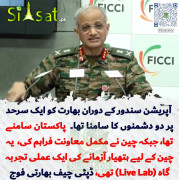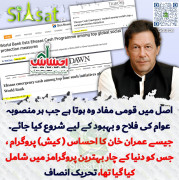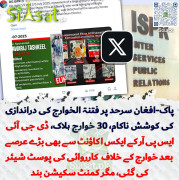Geek
Chief Minister (5k+ posts)
The problem with Pakistan is not just corruption – ineptitude pervades its bureaucratic culture of governance
Corruption is often considered the cause of all evils in Pakistan. But the basic problem is not just corruption. Rather, it is incompetence: those who run the country are incapable of doing what is expected of them.
Since Pakistan's independence in 1947, there has been constant repetition of slogans about piety and honesty by invoking the name of Islam and its early leaders, particularly great caliphs such as Hazrat Umar (R.A). What is often overlooked is that the key reason for Caliph Umar's (R.A) success was not only his impeccable honesty but his extraordinary competence in governance.
Can we find a leader like Umar (R.A) today? I have serious doubts.
In his famous speech of 11 August, 1947, Quaid-e-Azam Mohammad Ali Jinnah visualised Pakistan as a modern, progressive and democratic state where energies would be used for the uplift of its people and evils such as corruption, bribery, jobbery and nepotism would be stamped out.
His vision never saw daylight as he did not live long enough to oversee the building process of Pakistan devoid of all such evils. Obviously none of the things mentioned by Jinnah are new for modern-day Pakistan but they have had time to seep into and dent the national character and abilities in a big way.
Over the years, more and more people have assumed positions of relative power and authority because of connections or outright bribes. Once employed, they hone their skills of sycophancy and develop connections to assure promotions and/or lucrative appointments.
Quintessentially Pakistan has always been run by a permanent bureaucracy. At the lower levels most jobs are now literally for sale and go to the highest bidder or else to the best-connected applicant. The higher bureaucracy comes in through competitive examinations but once in place, for most of its members, further promotions and accumulation of wealth takes precedence over developing competence in any field of professional endeavour.
Even our politicians are victims of similar attitudes and every political office is pursued for the sake of financial benefits. Public service is at best given lip service. The recent scandal over fake university degrees suggests that unscrupulous people using bribes or connections made themselves eligible for election. It does not need any immense amount of thought to understand why such people want the elective offices. Unfortunately, there is a troubling history of the democratic process in Pakistan resulting in the election of leaders who are demonstrably both corrupt and incompetent.
After surviving the lost decade of the 1990s under such leaders, and then thriving under a dictator until 2007, Pakistan has once again returned to the bad old days. The economy is stagnating, inflation is high, there is a shortage of everything from food to water to power to security, unemployment is rising, and many are slipping back into poverty.
Looking at the recent history of successful leaders in the Islamic world, such as Malaysia's Mahathir Mohamad and Indonesia's Suharto, there have been serious allegations of corruption and abuse of power against them. And yet, it is their sufficient competence in delivering good governance to their people that has brought great economic success and remarkable human development to their nations, and ultimately a greater measure of competent democratic governance to their highly literate electorates.
Beyond the Islamic world, there are various levels of corruption found in both developed and developing nations – China is the prime example. But many of them have made significant strides in recent years, mainly because their leaders have been far more competent than those in Pakistan.
Today a terrifying level of incompetence pervades the entire sphere of governance in Pakistan. Because of bribery, jobbery and nepotism, the lower ranks of our civil bureaucracy are filled with incompetent and under-educated people. Most of these officials excel in preventing anything useful from happening.
The saddest part of this culture of incompetence is that our youth that end up in public service are either divested of their idealism and honest desire to perform or else are sidelined into meaningless dead-end desk jobs. Many of them are eventually seduced by corruption around them, for joining the herd is always the easier way out.
Is there a way out of this quagmire? Once ordinary people are truly empowered, many of these corrupt practices will in time dwindle and those who cannot govern properly will be replaced. There may be no harm in wishful thinking that Pakistanis can have both competence and honesty in their leaders. However, I would personally insist on competence to deliver good governance as a minimum criterion for leadership positions, if I can't have both.
http://www.guardian.co.uk/commentisfree/2011/apr/09/pakistan-competent-honest-corruptiongovernance
Corruption is often considered the cause of all evils in Pakistan. But the basic problem is not just corruption. Rather, it is incompetence: those who run the country are incapable of doing what is expected of them.
Since Pakistan's independence in 1947, there has been constant repetition of slogans about piety and honesty by invoking the name of Islam and its early leaders, particularly great caliphs such as Hazrat Umar (R.A). What is often overlooked is that the key reason for Caliph Umar's (R.A) success was not only his impeccable honesty but his extraordinary competence in governance.
Can we find a leader like Umar (R.A) today? I have serious doubts.
In his famous speech of 11 August, 1947, Quaid-e-Azam Mohammad Ali Jinnah visualised Pakistan as a modern, progressive and democratic state where energies would be used for the uplift of its people and evils such as corruption, bribery, jobbery and nepotism would be stamped out.
His vision never saw daylight as he did not live long enough to oversee the building process of Pakistan devoid of all such evils. Obviously none of the things mentioned by Jinnah are new for modern-day Pakistan but they have had time to seep into and dent the national character and abilities in a big way.
Over the years, more and more people have assumed positions of relative power and authority because of connections or outright bribes. Once employed, they hone their skills of sycophancy and develop connections to assure promotions and/or lucrative appointments.
Quintessentially Pakistan has always been run by a permanent bureaucracy. At the lower levels most jobs are now literally for sale and go to the highest bidder or else to the best-connected applicant. The higher bureaucracy comes in through competitive examinations but once in place, for most of its members, further promotions and accumulation of wealth takes precedence over developing competence in any field of professional endeavour.
Even our politicians are victims of similar attitudes and every political office is pursued for the sake of financial benefits. Public service is at best given lip service. The recent scandal over fake university degrees suggests that unscrupulous people using bribes or connections made themselves eligible for election. It does not need any immense amount of thought to understand why such people want the elective offices. Unfortunately, there is a troubling history of the democratic process in Pakistan resulting in the election of leaders who are demonstrably both corrupt and incompetent.
After surviving the lost decade of the 1990s under such leaders, and then thriving under a dictator until 2007, Pakistan has once again returned to the bad old days. The economy is stagnating, inflation is high, there is a shortage of everything from food to water to power to security, unemployment is rising, and many are slipping back into poverty.
Looking at the recent history of successful leaders in the Islamic world, such as Malaysia's Mahathir Mohamad and Indonesia's Suharto, there have been serious allegations of corruption and abuse of power against them. And yet, it is their sufficient competence in delivering good governance to their people that has brought great economic success and remarkable human development to their nations, and ultimately a greater measure of competent democratic governance to their highly literate electorates.
Beyond the Islamic world, there are various levels of corruption found in both developed and developing nations – China is the prime example. But many of them have made significant strides in recent years, mainly because their leaders have been far more competent than those in Pakistan.
Today a terrifying level of incompetence pervades the entire sphere of governance in Pakistan. Because of bribery, jobbery and nepotism, the lower ranks of our civil bureaucracy are filled with incompetent and under-educated people. Most of these officials excel in preventing anything useful from happening.
The saddest part of this culture of incompetence is that our youth that end up in public service are either divested of their idealism and honest desire to perform or else are sidelined into meaningless dead-end desk jobs. Many of them are eventually seduced by corruption around them, for joining the herd is always the easier way out.
Is there a way out of this quagmire? Once ordinary people are truly empowered, many of these corrupt practices will in time dwindle and those who cannot govern properly will be replaced. There may be no harm in wishful thinking that Pakistanis can have both competence and honesty in their leaders. However, I would personally insist on competence to deliver good governance as a minimum criterion for leadership positions, if I can't have both.
http://www.guardian.co.uk/commentisfree/2011/apr/09/pakistan-competent-honest-corruptiongovernance




































